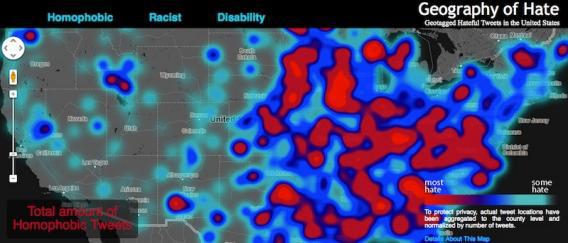Last week, the Floating Sheep website released a heat map called Geography of Hate, which plots the density of geotagged hate-tweets in the United States. (You may remember these guys from previous user-generated, geocoded projects such as Post Election Racist Tweets and the Great American Pizza Map.) As you can probably guess, the results are none too pretty.
The map allows you to sort for tweets that reflect homophobic, racist, or anti-disability attitudes. Within each category, you can also drill down another level to see, say, how many people are negatively tweeting the word spick—most of whom seem to live on the border between West Virginia and Kentucky.
The fact that some people are racist—or say appalling things on social media—should not surprise anyone. What is interesting, however, is the broad dispersal of hate. Really, the only term with an overwhelming geographic tendency is the affinity Texans apparently have for the word wetback. On the other hand, all you need to see to understand the state of racism in America is to filter for the N-word and watch half the country turn red. And not the half you’d necessarily think. The North appears to be just as racist as the South. It was disappointing for me to see my state, Pennsylvania, bathed in red hate. (Note: If you spend a little bit of time playing with the map, you’ll notice some weird things—like how apparently no one is racist in California and how people in northeastern Montana really hate cripples. The map’s creators performed all sorts of statistical gymnastics to ensure the project wasn’t skewed by population or just a few crazies in a given city. To learn more about the math, check out their blog.)
This effort is interesting because it forces us to confront the degree of racism that still exists. Another project that does this well is journalist Logan Smith’s Twitter handle @YesYoureRacist. The premise for the account is simple: Smith retweets people who say something along the lines of “I’m not racist, but …” and then go on to say unthinkably racist things. Classic hits include people who “aren’t racist” but think interracial couples are wrong, critics of other races’ driving abilities, and those afraid of anyone who looks Middle Eastern.
“We are most definitely not living in a post-racial society,” Smith told me. “And publicizing these statements helps others understand that. Hopefully, it spurs the conversation toward changing that or at least educating people on what racism means at the very least.”
Smith’s account has more than 30,000 followers, many of whom “blow up” the offending person’s account with replies and retweets. A vast majority of this conversation centers around the question of what qualifies as racism. And while Smith doesn’t hold any grand illusions about winning over the people he retweets or “ending racism” as a whole, he sees the handle as a way to get people talking. (He’s also in the process of writing a book about the experience.)
“I’m a firm believer that you have the right to say whatever you want and with that right you have the responsibility to accept the consequences of what you say,” Smith told me. “If you’re dumb enough to post an obviously racist statement on a public website, you deserve to be called out on it and for your ignorance to be on display.”
This whole post could be filed under “Obvious” if you deal with racism, sexism, ableism, homophobia, or other varieties of discrimination on a daily basis. But the point of these projects is to reach the many folks out there unaffected by such hate and likely to underestimate its prevalence.
Just spend five minutes looking at the #NotRacist hash tag on Twitter. There’s a lot of work left to be done.
